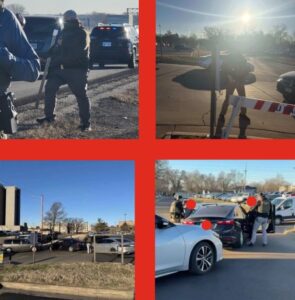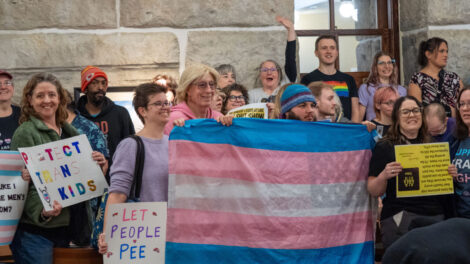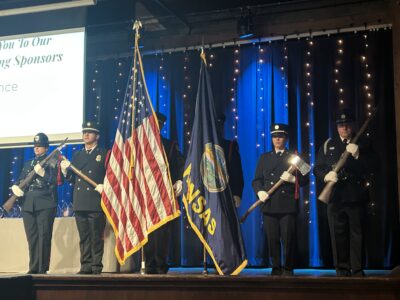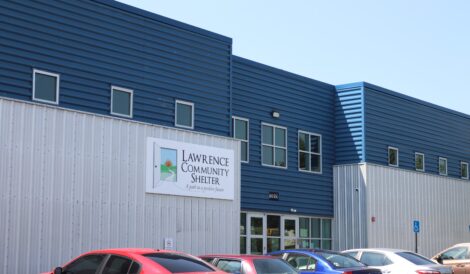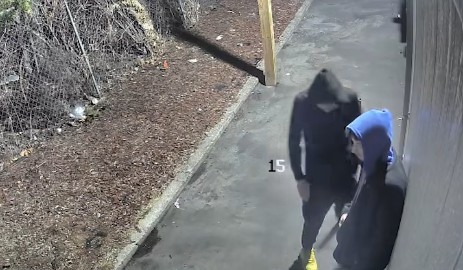To unlock more funding and expand its services, Perry-Lecompton volunteer library is trying to get voters to make it official
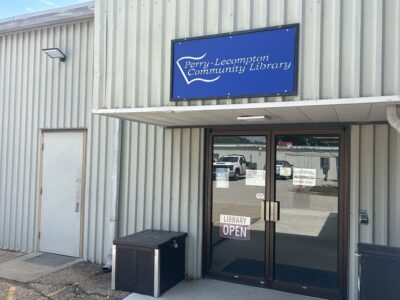
photo by: Bremen Keasey
The entrance to the Perry-Lecompton Community Library, at 203 W. Bridge St. in Perry. Leaders with the library — which is only open a few days a week — are circulating a petition to attempt to get a referendum on the ballot that would make it a district library and join the Northeast Kansas Library Association (NEKLS) to access more funding and resources.
Behind the district office for Perry-Lecompton schools, you can open the door to an unassuming hallway and suddenly be surrounded by thousands of books.
This is the Perry-Lecompton Community Library, at 203 West Bridge St. in Perry. It has over 12,000 books, 600 DVDs and 250 puzzles that patrons can choose from — if the library is open.
“Right now we’re only open 15 hours a week,” said Mary Guffey, the president of the Perry-Lecompton Community Library’s board and, like all of the library’s staffers, a volunteer.
The library is only open on Tuesdays and Thursdays from 9 a.m. to noon and 3 to 6 p.m., and on Saturdays from 9 a.m. to noon. But even with those limited hours, it’s become a key meeting place for the two small communities, and Guffey and fellow board member Alma Heckler want to expand its services by getting it officially recognized under state law.
They’re circulating a petition for registered voters across much of the Perry-Lecompton school district to try to get a referendum on the November ballot to create a library district. If the library could do that, it would be more than just an effort by a few volunteers. It would be eligible for grants from a regional library system that Perry and Lecompton residents already pay taxes to — and, one day, it might be able to more directly rely on tax money, like the Lawrence Public Library does.
“We’ll be able to provide more services down the road for our patrons,” Heckler said.
That would be a big step up for a library that started in a garage about a decade ago.
Heckler recalled how the library began when local resident Beverly Warren started offering books from her own collection out of a garage. Eventually, it moved to a grocery store, and then when the grocery store closed down, it relocated to its current site behind the school district’s office.
A similar small library had started in Lecompton, Heckler said, but staffing issues led to its materials being moved to Perry, and since the two communities already shared a school district, Heckler said it made sense to have a library that would serve both of them.
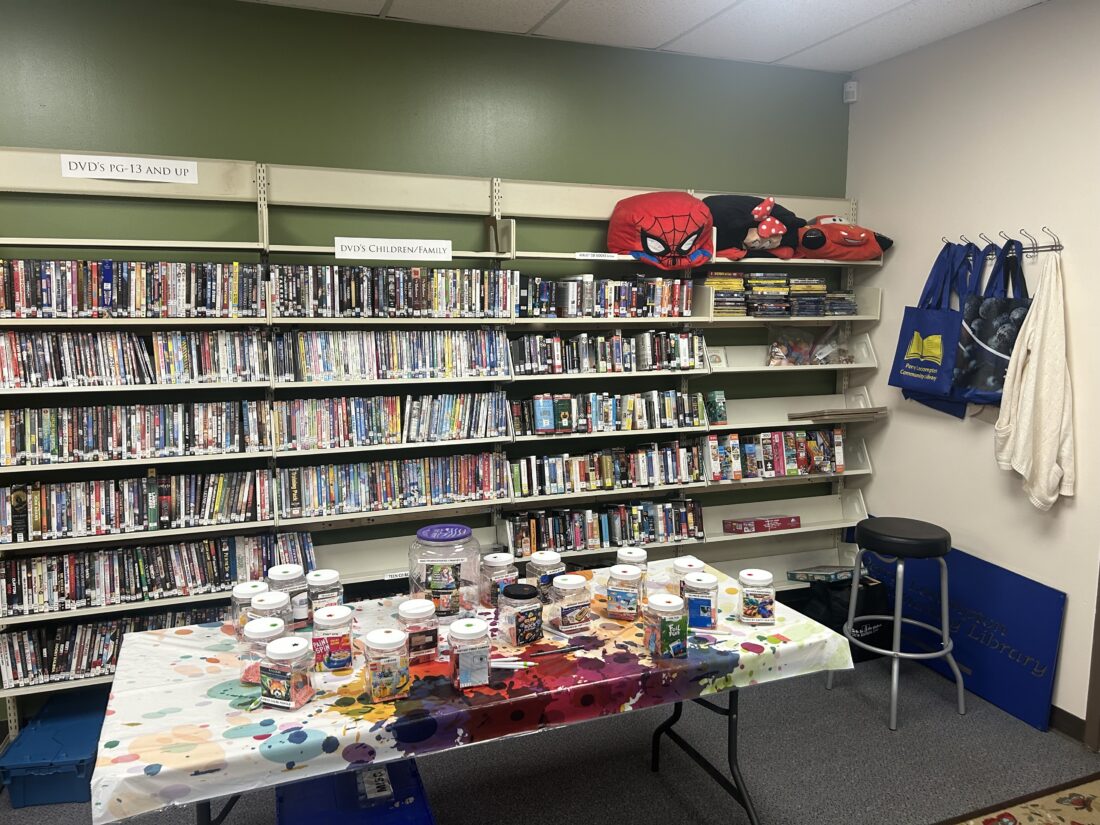
photo by: Bremen Keasey
The Perry-Lecompton Community Library has over 12,000 books in its collection, but it also has 600 DVDs and 350 puzzles on offer for its users. This photo shows a selection of the DVDs and puzzles, located on the bottom right shelf.
• • •
Taxpayers in Perry and Lecompton may not realize that they’re already paying taxes to a library organization. It’s called the Northeast Kansas Library System, or NEKLS, and it uses the tax revenue to provide grants and other resources to support libraries in 14 counties in northeast Kansas.
But the Perry-Lecompton Community Library can’t benefit from any of those grants, even though it is in NEKLS’ region and is even listed as a public library in NEKLS’ online directory.
That’s because, in the eyes of state law, the Perry-Lecompton Community Library isn’t an official library at all, but rather a volunteer organization.
NEKLS requires any library seeking a grant to complete its accreditation program. But one of the requirements for accreditation is that a library has to be legally established under Kansas statute, and Perry-Lecompton’s is not.
Guffey said most residents she’s spoken to were surprised to learn all of this. They weren’t aware that the tax they were paying to NEKLS wasn’t coming back to them, and so they’ve been in favor of the effort to get the library legally recognized.
There are several ways to do that under state law. One way is for an individual city, county or township to form a library. But Perry-Lecompton’s library project is tied to two separate cities, in two separate townships, in two separate counties.
But state law also allows you to set up another kind of library, called a district library, and that’s what Perry-Lecompton is trying to become. A district library is one that draws a geographic boundary, or district, that represents the area it serves and in which it can tax residents.
That boundary, for Perry-Lecompton, would be based on the boundaries of the Perry-Lecompton school district.
• • •
From the beginning, the library board has said that becoming a district library won’t involve any new taxes being levied.
The board says the effort is really about unlocking the benefits that residents of Lecompton and Perry are already paying for through the taxes they pay to NEKLS. A Facebook post on the Perry-Lecompton school district’s page about the library effort reads: “Joining NEKLS will make the Perry-Lecompton Community Library eligible for tax dollars already being collected and will not cause a tax increase in order to expand hours and services.”
To get a better idea of what the benefits are, the Journal-World reached out to Mike McDonald, the executive director of NEKLS.
McDonald said that if a library meets the accreditation standards, it will be eligible for funding called public development grants. This makes up nearly $1.2 million of the $1.4 million in grants NEKLS gives out each year, McDonald said.
District libraries can earn a base grant of $2,500 “regardless of what size of service level” they are, McDonald said, and they may be eligible for grant money beyond that based on their population. McDonald said that by his calculations — based on the fact that the Perry-Lecompton school district covers 6,280 people — the Perry-Lecompton Community Library could get $8,024 through the public development grants.
But that’s not all the funding the library could get. McDonald said the library could also apply for competitive grants, and since it would be “legally established,” it could seek grant money from the state itself or from other outside sources that it couldn’t access as a volunteer organization.
On top of the funding, McDonald said NEKLS provides other key services for libraries that become official, with the three most important being consulting, tech support and continuing education opportunities. McDonald said NEKLS staff can help libraries in the early stages of their official existence, providing consulting on a wide range of topics like how to follow Kansas open meeting laws at board meetings or how to curate their collections.
“We are a resource to the member libraries when they have questions that they don’t know the answer to,” McDonald said.
There are some libraries technically under the NEKLS umbrella, like the Lawrence Public Library, that are large enough to handle these concerns on their own, but McDonald said the services from NEKLS are crucial for small- to medium-sized libraries that “can’t afford to hire all that staff and expertise.”
• • •
But the Lawrence Public Library also illustrates something else that could eventually happen in a Perry-Lecompton library district — getting tax revenue directly, instead of through grants and services.
McDonald said that based on a state law that aims to ensure all Kansans have access to a library, Kansas taxpayers pay either to support a local library — like the Lawrence Public Library — or to support a regional system like NEKLS, which then uses its funds to assist its members. But those taxes don’t normally overlap, so although the Lawrence Public Library is in NEKLS’ territory and in its directory, the taxes paid by people in Lawrence go directly to support their library, not to NEKLS.
If Perry-Lecompton does form its own district, it could start a process to become more like the Lawrence Public Library. But McDonald said that you can’t do this immediately after forming a library district. Instead, he said a library district would have to levy a small tax while still being part of NEKLS’ taxing jurisdiction, “and you have to do that for two years.”
After that time, the library could petition the state and ask to have NEKLS removed from its taxing area.
“You can’t just drop a regional system immediately,” McDonald said.
If Perry-Lecompton got out of the NEKLS taxing area and started levying its own taxes, McDonald estimated that NEKLS would lose around $115,000 to $120,000 in tax revenue. “That’s not insignificant for us,” McDonald said, and while NEKLS would be able to “absorb” that change, if many other libraries did the same, that would “change the conversation.”
When you consider the access to additional services and the possibility of having more control over its tax dollars, McDonald said he understands why the Perry-Lecompton Community Library wants to get official.
“There is a real incentive for Perry-Lecompton to form a district library,” McDonald said.
• • •
Although Guffey and Heckler have gotten a good response from the community so far, they also say the process has been complex to figure out, in part because of the two separate counties involved.
Their petition to form a district needed to get approval from the commissions of both Douglas County, where Lecompton sits, and Jefferson County, where Perry sits. Even more complicated, it will need a certain number of signatures from voters in specific parts of each county.
Specifically, the petition needs at least 37 people who live in the Lecompton city limits and 138 from the unincorporated parts of Douglas County within the district. Additionally, no one in the city limits of Lawrence can sign it, even though there are some people who live in the boundaries of the Perry-Lecompton school district but have Lawrence addresses.
In Jefferson County — where Heckler said the guidelines were more “vague” — the petition needs 203 signers from the rural, unincorporated parts and “50 to 60” signers from Perry.
“It’s a complicated process,” Heckler said.
Heckler said the library got help from an attorney in Lawrence to ensure all the groundwork was properly laid for forming a library district. And, before they even began circulating the petition, she and Guffey were already getting feedback to find out if the community had the appetite for it.
Once the petition was approved by Jefferson and Douglas counties, Heckler and Guffey began working to get signatures, popping up at events in town and asking friends for help. Guffey said she got signatures from senior citizen groups that meet at the library’s building, either for a monthly luncheon or for coffee. Heckler said members of a community quilting group offered to help collect signatures.
“A lot of people in the community want to help out,” Heckler said.
Guffey said people interested in signing the petition can come to the library during its regular hours or call the library to set up another time to sign it; its number is 785-329-3430. If the petition gets enough signatures before the Sept. 1 deadline set by the two counties, then the question of whether Perry-Lecompton will form a library district will be on the ballot.
• • •
It’s still a long way before a library district can become a reality, but Guffey and Heckler can think right away of some things they would want to do with extra resources.
Having additional funding might mean the library could be open more than just a few times a week. Heckler said that would be a “big advantage” from the additional funds. The library currently has five volunteers, Guffey said, and no full-time librarian. But if the library could add a full-time librarian to focus on collection development, that would make it easier to offer more books that people want.
There might also be more money to purchase those books with.
As an example, Guffey mentioned the library’s summer reading program for kids 8 to 12 years old, which began with just six or seven kids a few years ago but now has more than a dozen kids signed up. Heckler said some of the most popular types of materials for that group were graphic novels, which the library “did not have much of.” The library held a fundraiser last fall specifically to acquire more of those books, but Heckler said having more funds would make that process go faster.
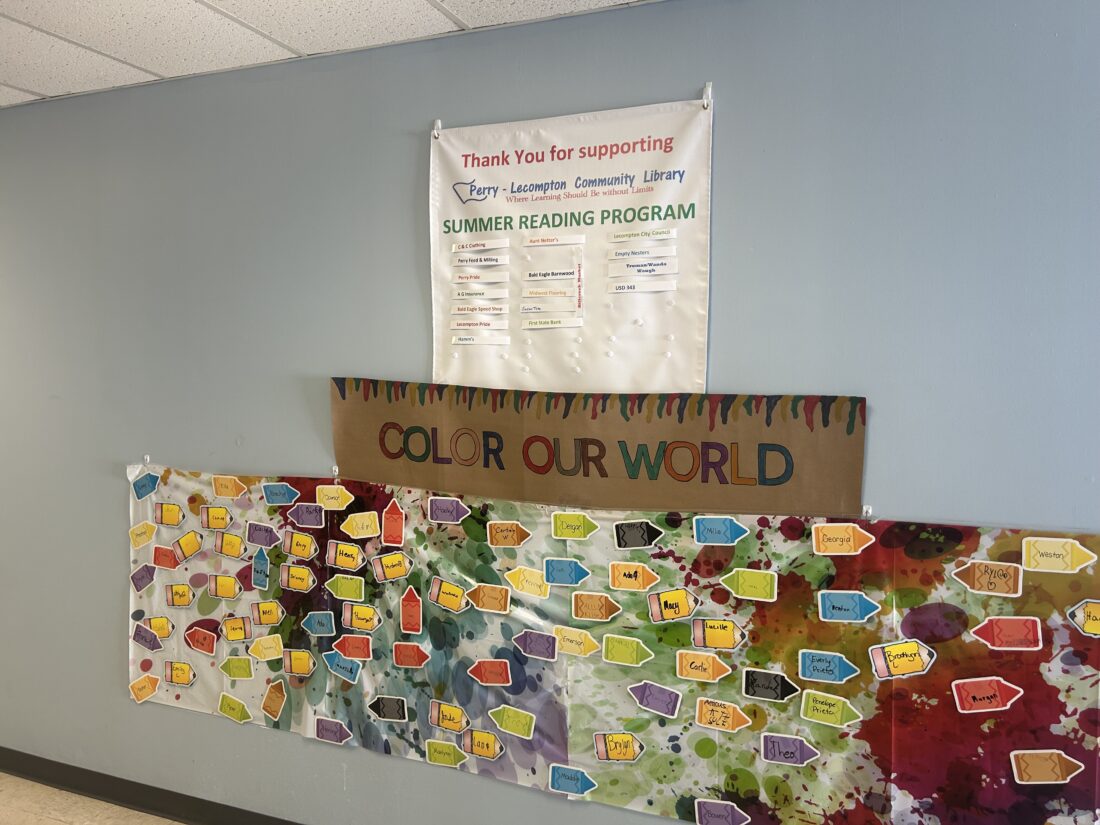
photo by: Bremen Keasey
A sign celebrating the Perry-Lecompton Community Library’s summer reading program. Leaders with the library said it has grown each year, and it hopes to get more reading materials if a referendum is approved to become a district library.
Acquiring other materials like audiobooks and large-print books are other things the library is looking into, Guffey and Heckler said. They’re also exploring a seed library for gardeners, as well as accessibility improvements such as lower shelves that everyone can reach.
And, for a rural community where internet service can be spotty, Heckler said adding more devices such as computers, printers and copiers will also be important. Right now, the library has three computers and a few printers.
“We could do a lot of different things … not just (get more) books,” Heckler said.
More than anything, Heckler and Guffey think having more resources will help them build a better community. The library is in the heart of town, right near the city hall of Perry and a few blocks from the post office. Being able to expand its hours and its offerings can make it even more of a hub for the community, Heckler said — not just an easily overlooked corner of a school district office.
“We’re a small, rural area,” Heckler said. “We just need these kinds of places.”
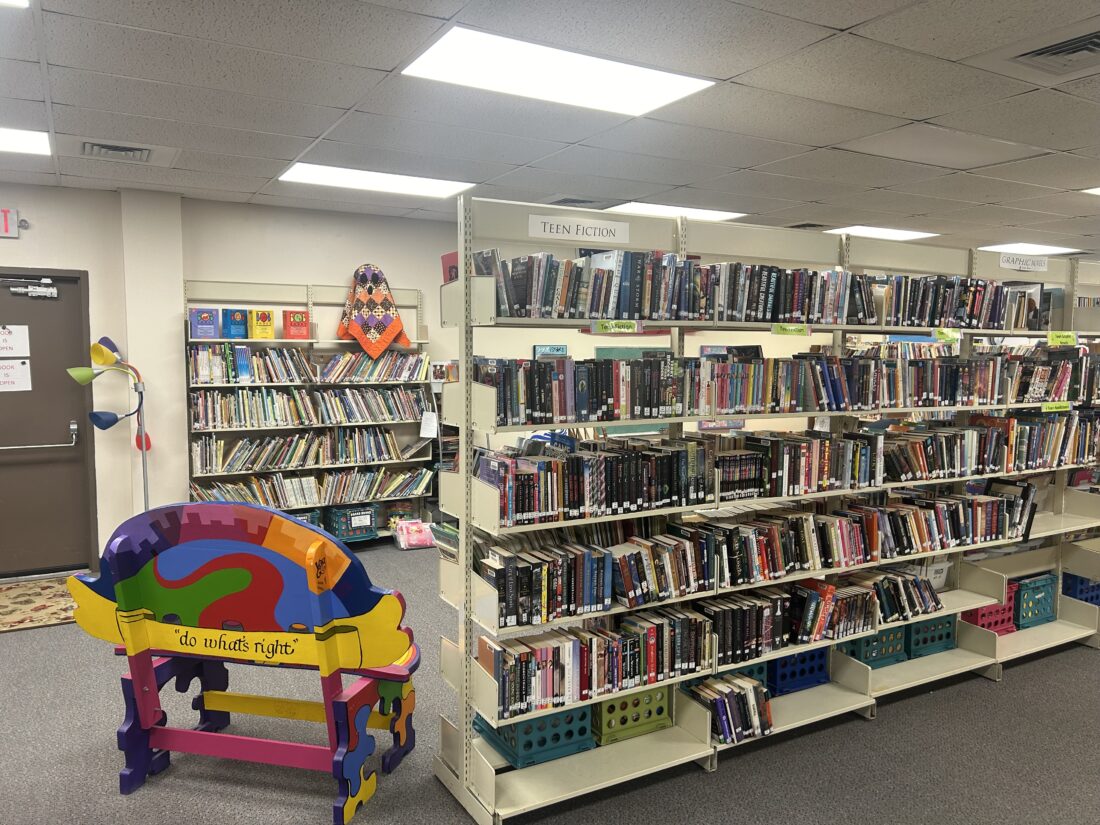
photo by: Bremen Keasey
The Perry-Lecompton Library has over 12,000 books in its collection.


